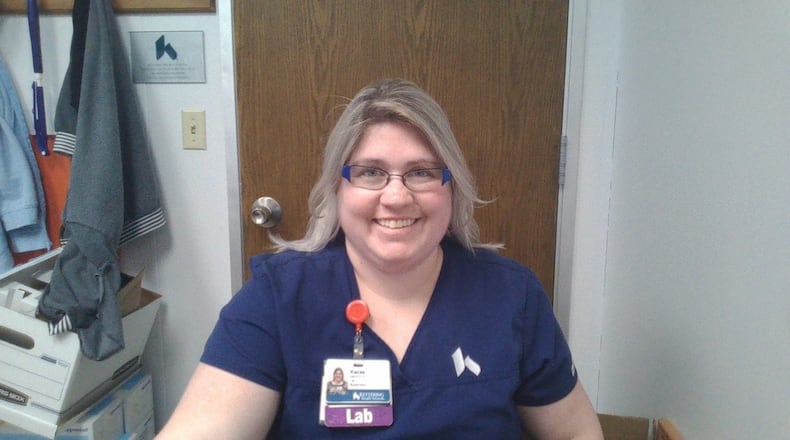Hometown (where you live now): Huber Heights
Job title: Molecular Testing Supervisor
Where do you work: Kettering Medical Center
Describe what your day is like/what you do: As the general and technical supervisor, I wear many hats. I work to bring in testing that has benefit to our patients and our providers, using sensitive molecular amplification assays for pathogen detection and optimizing our immunophenotyping program for our leukemia and lymphoma patients.
My staff includes six full-time medical technologists, and I act to help them through training, troubleshooting and review. We also try to have a few laughs along the way to keep things light-hearted. My day may include time at the testing bench, or I may be involved with analyzing data from a patient’s bone marrow aspirate or tissue sample to help our local pathologists determine a pathological diagnosis for the patient’s primary provider or oncologist. Part of my day includes rounding with my techs to review quality data and check on trends. My phone also keeps me busy for any technical questions that come from network physicians, pharmacists, infection control nurses, and administrators about our work and impact.
RELATED: Health Care Hero: ‘We are all in this together’
What inspired you to get into health care? My experience actually started with an internship in high school at a local laboratory. I had already been interested in DNA and cellular mechanisms through classwork, but getting exposure to clinical testing at such a young age truly was where my health care experience began. Throughout my higher education experience, I enjoyed working in a clinical laboratory during my breaks from school, having exposure to many departments of testing and their individual contributions to health care. Originally, I had been working toward epidemiology-based research in school, but I found myself drawn to the direct impact the clinical laboratory made in the lives of patients. Molecular testing was not common in clinical laboratories at that point, apart from large labs associated with research hospitals. It had a rocky start to get a main foothold, but then more companies invested in the technology and it began to spread in influence and utilization. I have had experience in molecular research, private molecular and molecular clinical laboratories since finishing my master's degree, and clinical is the one that truly holds my heart. Helping patients to feel better faster is what makes me want to contribute all I can to health care.
MORE: Health Care Hero: CT tech on the front lines of coronavirus
What's a memorable experience you've had in health care? If I discount the experience we are still working and living through, one experience among many comes to mind. I was working to trial a new technology for the detection of pathogens that are commonly found in patients with encephalitis and/or meningitis. The assay we were trialing detected a pathogen that had failed to grow via traditional culture method, which is a fairly common occurrence between the methods. However, since it was a study, the result was academic at that point. The results of the study were discussed with a physician who had a working relationship with the microbiology and molecular testing departments and noticed that the patient was not thriving. This prompted the spinal fluid sample to be sent out for molecular testing performed by a laboratory who had already validated the test. The information was used to change the patient's antimicrobial therapy, and the patient began to feel better within hours. Hearing about this abrupt change and how much a clinical molecular test had affected the patient's quality of life during their illness for the better really stuck with me.
What do you want readers to know about your job right now: As coronavirus information becomes available from research groups around the world, we are better able to optimize testing, and manufacturers are working to produce more kit reagents. I know there is some frustration with not being able to test everyone right that minute to find out if they have the virus. We are always working to get to that point, where we can assuage fears and provide peace of mind. Please continue to support health care workers in their endeavors to make sure everyone stays safe and as healthy as possible during this trying time.
About the Author
